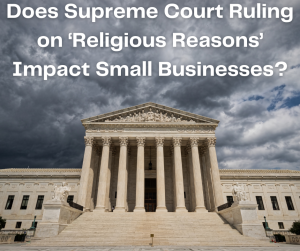Small businesses and other employers are likely to find it more difficult to refuse requests for religious accommodations after the U.S. Supreme Court’s ruling in a recent case, Groff v. DeJoy, which concerned a postal worker who unsuccessfully requested to be off-the-clock every Sunday—when the post office still makes deliveries for Amazon—citing his Evangelical Christian faith.
Gerald Groff, a Pennsylvania man, nonetheless kept being put on the schedule for Sundays and disciplined for not working while his co-workers were stretched thin attempting to cover his routes. He resigned, sued, lost his case and lost again on appeal—but the Supreme Court’s unanimous ruling in June established a higher standard for employers who claimed they would face an “undue hardship” to make religious accommodations.
In the opinion written by conservative Justice Samuel Alito, the court defined “undue hardship” as an accommodation that “would result in substantial increased costs, in relation to the conduct of the particular business.” This likely will mean that larger employers have a challenging time prevailing based on their greater ability to absorb the cost of the accommodations; however, small businesses might sometimes have a stronger case.
While it did not affect their decision on the Groff case, the justices did allow for scenarios where the impacts of an employee’s request on co-workers and thus “the conduct of the particular business” could amount to an undue hardship. But if co-workers’ objections are based on either religious prejudice, or opposition in principle to religious accommodations, no such hardship would exist, in the court’s view.
In any case, it seems likely that employers of all sizes will be fielding a higher number and wider array of religious accommodation requests in the wake of the Supreme Court ruling, including those related to hot-button political issues like vaccine requirements and LGBTQ+ rights and related employer diversity efforts.
Unless an employee is either not fully literate or not fluent in English, such requests should be required in writing and at least briefly expound on why the policy or practice of the business clashes with the religious beliefs of the employee. Employers can then review them to make sure they are based on religious issues; for example, while an employee concerned about the safety of a COVID vaccine might or might have a legitimate anxiety, but it’s not faith-based.
If an employee is presenting a religious objection, the small business can certainly attempt to determine whether it’s a sincerely held belief or trumped up; but if there’s any question, employers should give the worker the benefit of the doubt. And in that case, the business either needs to go along with the request for accommodation or seek an “undue hardship” determination based on the stipulation first laid down in the Americans with Disabilities Act, which said it must involve a “significant difficulty or expense” based on factors like the employer’s size, wealth and type of business.
What all this means is that small businesses will have an easier time seeking that “undue hardship” determination—but not an easy one.
 Chicago Business Attorney Blog
Chicago Business Attorney Blog


